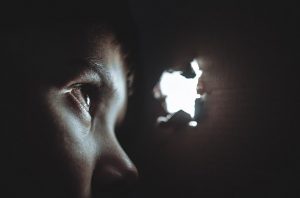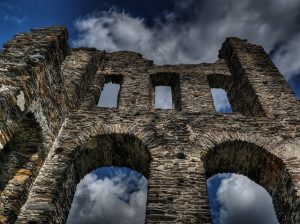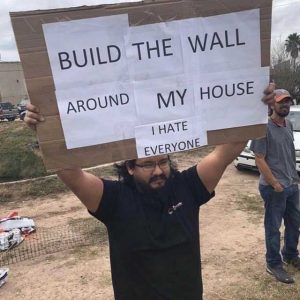Why are people so passionate about walls? In an age of airplanes, drones, mass media, and the internet, physical walls are obsolete in the face of terrorists and opposing ideas. But walls abound, between nations, between neighbors, and within our own selves.
As a child, I grew up learning that emotions weren’t allowed. “Quit crying, or I’ll give you something to cry about!” was an oft-heard phrase that was ingrained into me. Out of emotional survival, I learned to suppress my feelings and even thoughts. I became overly serious, a “sixth-grade old lady” as my teacher once described me.

As a teen, I often thought about what people would think if they knew what I was really like inside. Insecure, I continued to build the walls between who I was and who I felt the world would approve of.
I was in my mid-twenties before I realized that my internal walls, built so carefully to protect me from emotional hurt and censure, also prevented me from experiencing joy, and freedom. I felt like a hermit who had walled himself away from the world so well that he could no longer breathe. I took a sledgehammer to those walls and chaos reigned. My emotions overwhelmed me and many of those around me. I had no healthy way to keep them in check. I discovered that what I felt, I felt deeply, passionately, but had no skills to control them. It took a long time to learn where walls were appropriate, where fences were better, and where no barrier needed to exist.
One reason it took so long, was that I had one wall I’d forgotten even existed. I had lived with the internal wall between me and ME for so long, I didn’t even know who I was anymore. Like an episode of “To Tell the Truth,” I wanted to ask, “Will the real me please stand up?” But I was afraid. What would others think? What if I didn’t like the real me?
Fear. Fear is the mortar that binds all walls, within and without.
Our ancestors built walls to protect themselves from the things they feared: wild animals, marauders, armies, strangers, spirits – the Unknown. But walls were breached, undermined, or made useless by siege and/or betrayal. The arrival of gunpowder in Europe spelled doom to the construction of great walled castles.

Then why are so many so intent on building walls today? Is anyone seriously afraid of refugees seeking asylum for themselves and their families? Words like Protection, National Security, Job Security are simply synonyms for Fear. As others have pointed out, the vast majority of illegals in the U.S. come here legally and overstay their visit. The preponderance of imported illegal drugs do come over the southern border, but via the normal ports of entry that are simply overwhelmed and understaffed for the amount of traffic. And terrorists have access to the home-grown disenfranchised via social media.
But the fear remains. It is the fear of change, the fear of losing the status quo, the fear of the unknown.
The same fear paralyses a wife and mother from leaving an abusive relationship: “He’s a good provider, and I don’t have the skills to support a family,” she rationalizes to stay in place instead of venturing into the unknown.
The same fear held an acquaintance back from seeking help to get the medical assistance and disability he was entitled to. Could he handle the money responsibly if he got it? What if the medical help actually worked? Could he live a normal life again? Did he want to live a normal life again?
Others fear that what they have worked for may be taken away. [Note: I find it ironic that some of these same people who see no problem with being taxed for a wall, fight vociferously against something like universal healthcare.] But what they really fear is change. What if refugees moved in next door? What if my child becomes friends with one of those kids at school?
And all the complaints I hear from people in-between – “normal” people: Nobody at the fast food restaurant even speaks English now! Are they going to make Spanish a legal second language? Why does she get to cover her face and I can’t wear my favorite hat? They’re going to drive housing prices down (or up, depending on the speaker.)

Yes, at all levels, there is an undercurrent of racism, other-ism. Fear of change, fear of the unknown.
Humanity around the world in general has experienced so much change so fast, that our heads are reeling, collectively and individually. When my grandmother died in 1983, I reflected on the changes she had seen in her 83 years. She was a nurse during the Spanish Flu epidemic and lived through two World Wars, Korea and Vietnam. She saw the Berlin Wall go up, vast improvements in medical care, the Roaring 20’s and the Psychedelic revolution of the 60’s and 70’s. The invention of the radio and man on the moon.
But my 60 years have seen as much if not more, if in different ways. Growing up in the 60s and 70s, I saw computers go from occupying huge rooms to fitting in my hand. Black and White TV to — again — a color TV in my hand. As a kid, I knew people who still had crank telephones on the wall; now kids don’t even know how a rotary phone works. (If you don’t know what I’m talking about, that’s OK. Google it.) I had chicken pox in kindergarten; there’s a vaccine for that now. We’ve become more and more mobile, and the ties that held us to hometowns and families are loosened or cut entirely.
There is a reason that anxiety is at high levels for all segments of society. We are built to resist change as potentially dangerous. Yet it is everywhere, at increasing speeds. And we feel helpless, vulnerable.
So when someone says, “Let’s build a wall,” we want to get on the bandwagon. Here’s something tangible, something to DO, against the feeling of helplessness. Never mind that in the private sector the return on investment would never get past a focus group, let alone a corporate board. Sadly, emotions are in control here, and not reason. And the more we are pushed when emotional, the more we get entrenched and lash back.
We fear change, but change is inevitable. Even the stars change their places in the heavens over time as they fly through the universe. The earth shifts on it’s axis. Climate changes. Kids grow up. We grow old and die. And there lies the ultimate change, the ultimate unknown.
But for now, let’s take a step back from the precipice and try to look at things less emotionally and more reasonably. Our country was built on change – both good and bad – and there is nothing in history to suggest that change will stop. So let’s get proactive and guide it. Yes, we need better border security. Let’s give our border patrol better funding, training and tools, to stop the drugs at the ports of entry. Set up a better way of handling asylum requests, to take the teeth out of the Coyote’s profits. Fund the resources needed to track the visa over-stayers. Quit ignoring the ways our enemies use social media against us, and use that knowledge for our benefit and safety.

But, perhaps more importantly, let’s look at the walls we have built around and between ourselves. Are they really necessary? What are we missing out by letting them stand there, separating, dividing, nullifying? Could we be building something much stronger, better, more beautiful, and beneficial to all if we reached through and built together?
Thanks. me too.